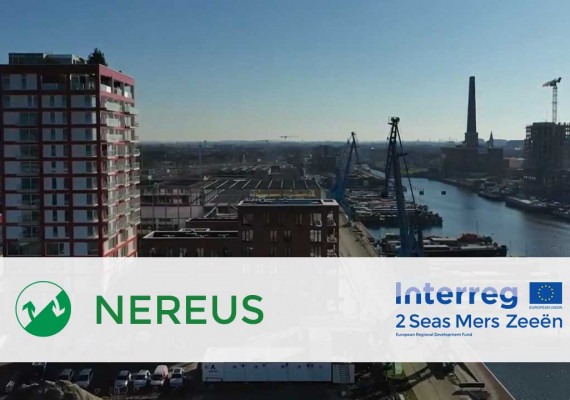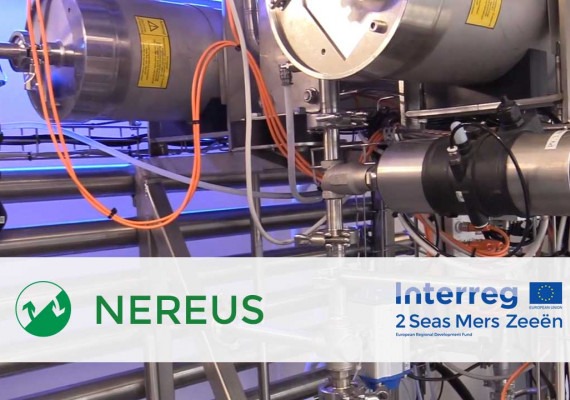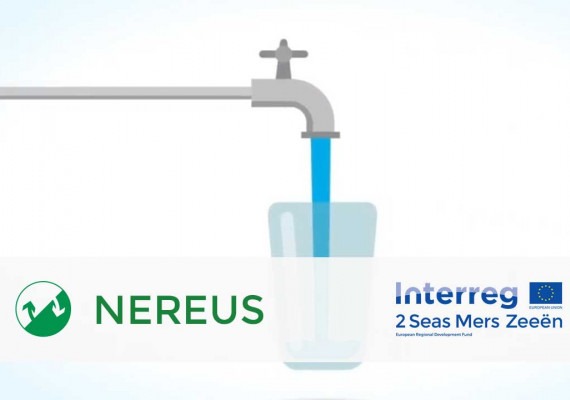NEREUS
New Energy and REsources from Urban Sanitation
Priority Axis
Resource Efficient EconomySpecific objective
Circular Economy
Lead partner
VITO NVContact
Begindatum
01/10/2017Einddatum
31/12/2021Project budget
6 545 091 €ERDF amount
3 249 756 €ERDF rate
50%Over
Common challenge
The NEREUS project sought to further the development of a green economy in the 2 Seas area by transforming wastewater into a valuable source of water, recovering useful resources (for example cellulose or nutrients) and reusable energy. More specifically, due to climate change, water scarcity is increasingly problematic, resulting in a growing need to reuse wastewater. Finite nutrients such as phosphorus are crucial for agriculture and currently not recovered from wastewater. As a result, these resources cannot be reused in a meaningful manner (e.g. as fertilizer). Wastewater also contains energy and heat that could be used as a sustainable source of energy in order to reduce CO2 emissions. Although there was a growing conviction that future arrangements for the treatment of wastewater should be based on the principles of a circular economy, and although the technology was available, decision makers were still hesitant to make use of them due to the lack of practical evidence.
Overall objective
Main outputs
Cross border approach
Main Achievements
European decision makers remain hesitant to consider wastewater as a valuable resource instead of a waste product. This shift, however, is crucial to evolve towards a circular economy that safeguards natural resources. Although the right technologies are available, implementation is often neglected due to the lack of practical evidence. Research and demonstration projects such as the NEREUS project aim to bridge that gap by putting innovation into practice.
For four years, the NEREUS project researched and demonstrated how to recover energy, water, and nutrients from urban sanitation and how to repurpose them. In the final project year, the learnings of local demonstrations in 4 Member States accumulated into four ready-to-use tools and 1 roadmap. These aim to boost innovation by facilitating recovering and reusing water, energy, and nutrients in urban areas.
A Decision Support Tool created by the project helps public and private decision makers to select the best processes to recover resources from urban wastewater. The web-based tool is designed to speed up implementation, considering the economic, environmental, technical, and social aspects. Freely available through nereus.vito.be, the tool provides environmental and budget friendly treatment trains. On this topic, two scientific articles were published in the Journal of Environmental Management.
The Feasibility Tool on the other hand, allows a high-level assessment of how financially feasible a case is. The user can assess whether the business case is feasible, what drives it and what needs to be optimized to achieve a profitable outcome. Once ready for implementation, businesses might want to exchange water with neighbouring companies or agriculture. Different types of model cooperation agreements were developed as a framework to boost water partnerships. The agreements and the Feasibility Tool, as well as a tutorial on how to use it are available through nereus-project.eu/tools.
The work of the NEREUS project culminated in a professionally hosted closing conference presenting the local demonstrations and tools to over one hundred attendees by means of inspiring video's, presentations, and discussions. Looking to a circular future by recovering valuable resources from wastewater, it is in the best interest of the 2 Seas area that successful projects like NEREUS give rise to more sustainable innovation.
Testimonial
European decision makers remain hesitant to consider wastewater as a valuable resource instead of a waste product. Although the right technologies are available, implementation is often neglected due to lack of practical evidence. Research and demonstration projects such as the NEREUS project aim to bridge that gap by putting innovation into practice.



